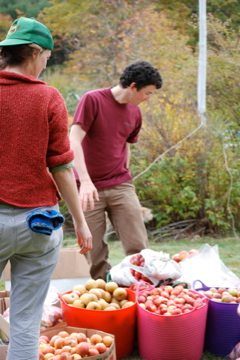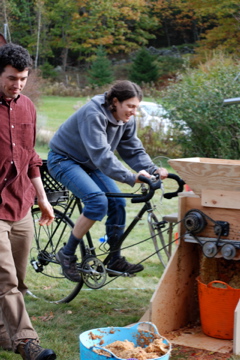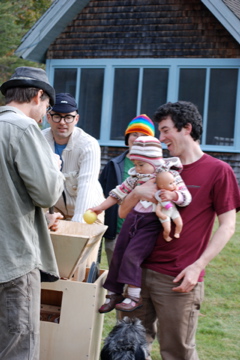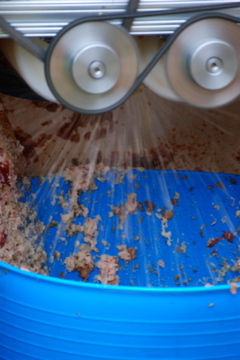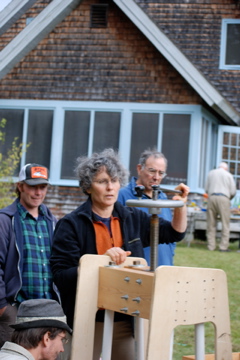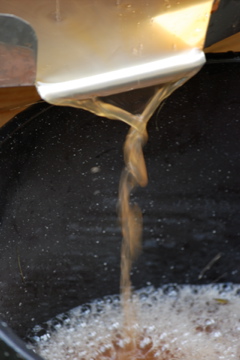While most of the holiday weekend was consumed in food-and-drink related revelry, we did manage to push the orchard project forward a bit. After putting a new roof on the north side of the eastside workshop on Saturday morning, we spent a couple hours in the afternoon felling the last three pines in the area to the south of the orchard to let light in. We also extracted some saw logs from the piles of brush with peavies (it’s too wet in there for machinery after the recent rains), and cleared out some scrubby growth so we could pull a chipper into the area where we’ve been working. In this era of global warming, burning big piles of brush seems like dubious behavior, and the soil can always use more organic matter. I’ll go and update the to-do list to reflect recent progress and plans…
Archive for November, 2008
Let there be light
November 30, 2008Economic Tehcnology
November 23, 2008Nine months ago I wrote a post trying to understand how economies work from an engineering perspective. The basic idea was that an economy is a technology (hereinafter “The Technology,” for theatrical effect, alternatively “Tehcnology”) for turning raw materials, energy, and labor into stuff that people want. Crudely speaking, we have built a global machine that inputs dirt, oil, and human effort and outputs toasters etc. Three classes of potential failure modes (where failure is defined hypothetically as fewer toasters, or fewer toasters per unit input) are then apparent – first, running short of raw materials or energy; second, a decrease in demand for stuff, and third, technical difficulties within The Technology itself, e.g sand (or sabot) in the works of the economic machinery.
I proposed at the time that the first failure mode was in the offing but not yet squarely upon us, that the second was unlikely given human nature, and that the third was annoyingly opaque from an engineer’s perspective. Unlike, say, a pedal-powered apple grinder, the dominant mechanisms and feedback linkages of The Technology are not immediately apparent on observation, and might well bollix things up even in the absence of “fundamental” limitations. I concluded:
Rather, it seems that the economic technology is in the process of throwing a rod… All in all, it seems that while we are in no way doomed to privation by energy scarcity, there’s no guarantee that the economic technology will respond well to to the stresses that it is just beginning to feel. Maybe we’ll get electric trains, plugin hybrids, and virtual reality telecommuting, or maybe we’ll get to experience the 1930s all over again, only this time with rising seas, monster hurricanes, and religious fanatics holding the world’s energy lifeblood. I’m hoping (and working) for the former, but sadly it’s not really in the hands of the engineers, and if it comes to the latter, I hope I’ll at least have some cider to drink…
At the time oil was $90 and the Dow was 12,500. Since then oil has been up to $140 and down to $50, and the Dow has fallen steadily to ~8000, providing plenty of food for thought on resources and economics.
First of all in translating from the economics mindset to engineering we face the conundrum of debt. The concept is pretty straightforward seen from the home economics perspective – if Joe the Plumber buys a brand new speedboat on credit and can’t make the payments, the repo man takes it away and puts a black mark next to Joe’s name. But seen from an engineering perspective at the macro scale, the story goes as follows: “The Technology successfully marshaled materials and labor and produced a working speedboat. In fact, It produced millions of working speedboats. There were subsequently a handful of minor disputes regarding rightful possession of the same.” The point is, from a standpoint of technical achievement, the prize gets awarded when the speedboat (or toaster) comes off the end of the assembly line. That is not to make any claims about sustainability (whether we can continue making speedboats indefinitely), nor about distribution (whether that particular plumber deserved that particular speedboat), nor social justice (whether a bunch of Chinese kids were abused in the production of said speedboat), it’s just to say that claims like “It’s all built on a mountain of debt!” however factually accurate, do not detract from the purely technological achievement – The toasters and speedboats were in fact produced, fair and square.
So, an engineering characterization of the recent debt-fueled housing and consumer bubble might be: “The Technology got overheated and spewed forth a huge quantity of toasters, speedboats, and large vinyl-clad single-family houses. In the process a bunch of dubious promises got made, which are likely to result in disputes over rightful possession. The possibility exists that toaster production rates may decrease significantly in the ensuing confusion.”
The question of demand is also a bit more complicated than proposed in the first-order model. While it is unlikely that the acquisitive and status-seeking nature of the human social animal will be repealed in this lifetime, recent events remind us that it can be driven by fear into a temporary hiatus, and this has important consequences. It turns out that consumer spending accounts for 2/3 of the economy in the US, and much of this spending is discretionary. This brings up an interesting problem. If people start worrying about their jobs, they may (sensibly) decide to cut back on buying toasters and speedboats in order to save their money, against a time when they are laid off and want something to eat. But on aggregate this has the unfortunate consequence of shuttering the toaster factory, whereupon the former toaster workers have plenty of time to do their own plumbing, and so on. Everybody loses. This is an example of an annoying internal problem with The Technology; it has nothing to do with the supply of dirt, or oil, or the toaster-making machinery, but rather an imperfection in teh intricate mechanisms. It reminds me of an underdamped mechanical system – basically any time you have a system with inertia and a restoring mechanism, there’s the chance that rather than smoothly settling at a stable value it will oscillate wildly about the equilibrium point. This seems to have been the basic contribution of the economist Robert Shiller – he pointed out that markets can act as underdamped systems, with mob thinking acting as the inertia and reality acting (belatedly) as the restoring force. (Apparently the prevailing economic view was that the market always perfectly reflected the underlying value of whatever was being traded. Any real engineer who has ever built a dynamic control system knows how hard it is to get zeta [the damping ratio] to be exactly 1.) Economists are funny critters – they call what they do science, but a guy at work made the point the other day that in economics a bunch of people with diametrically opposed views can all win Nobel prizes, and even decades later nobody knows who is right…
The conventional answer to the predicament of undershoot in consumption is for the government to step in and spend piles of money, by printing it if need be. Joe gets a job fitting pipe for the new government stadium, so he feels flush and goes out and buys another speedboat. So far so good. But what if what’s lurking at the other end of the current slowdown (or perhaps even part of what triggered it) is actual honest-to-god resource constraints? Based on my understanding of the global energy system I think there’s a pretty good chance that this is the case. Then, rather than buying a speedboat, Joe should be encouraged to get a smaller, lighter truck, insulate his house, get some solar panels for his roof, etc. These things can also be mechanisms to drive near-term economic growth, but they require a lot more insight, focus, and discipline than just sending everybody a check. It’s not at all clear that our political system and economic tehcnology are up to the job.
In other news…
November 23, 2008Six carboys of cider racked to secondary this weekend. Winter hit New England hard, like it means business, and it put me in a cooking mood. Four loaves of Sherwood Inn dark bread baked. Several butternut squash that were starting to get soft roasted, pureed, and frozen. About a gallon of low-grease, low-sugar granola baked. 25 black bean burgers cooked and frozen. Big tray of mixed root veggies from the garden roasted with herbs and olive oil.
Cider equipment plans
November 8, 2008WordPress has a nifty little page where it says which posts on a blog get the most attention. From this I gather that most of the traffic on this site appears to be pedal-power enthusiasts. Accordingly I’ve started documenting an improved (simplified, more corrosion-proof, etc.) version of the pedal grinder design, on a page on this site. So far I just have designs for the grinder drum and blades. More to come as I get around to it.
Posts I could write
November 8, 2008Six carboys are ticking away happily in my office closet, and today I took apart the pedal grinder and scraped the apple sludge out of the crevices – hopefully by next year we’ll have a more streamlined, easily cleaned assembly based on this year’s successful architecture. A lot has been going on, and I haven’t had the chance to do much of it justice in this blog. As a placeholder, here’s a list of posts I’ve thought to write recently:
- I picked out five new apple trees from Fedco to plant in the empty spots in the orchard next spring.
- The garden is pretty much cleared out; I harvested about a bushel of root veggies (potatoes, carrots, beets, turnips) from an area smaller than our small kitchen. This makes me unreasonably happy. Root vegetables seem to have a dietary and spiritual substance that other garden vegetables lack.
- Alexis is half way through her last year of med school, studying for the national exam. Soon she will be interviewing with residency programs around the New England area.
- I’ve been playing a lot of music recently, and today I bought a decent quality fiddle and bow to replace my rock-bottom beginner hardware. Probably one of the bigger discretionary purchases I’ve made.
- At Kauf’s suggestion I recently read Deep Economy by Bill McKibben. I’m generally sympathetic to McKibben; long ago I was influenced by his End of Nature. But I can’t decide whether the book is potentially prescient, or merely hopeful.
- Meanwhile, the actual economy continues to falter. Venerable financial institutions have stumbled; a fifth of mortgage holders owe more than their property is worth, and folks are too scared to shop – it seemed the day would never come.
- On the work front, Holly and I have made what may turn out to be a modest advance in an aspect of solar cell processing technology.
- The financial crisis has dramatically changed the landscape facing renewable energy companies. The birth rate of cleantech startups may be slowing, and existing companies are being advised to cut costs and prepare for a rough time.
- The US just picked a smart, progressive black guy to be the next president – how cool is that? Unfortunately, he’s taking office just as a once-in-a-century multifaceted shitstorm blows in. On the bummer side, California wrote marriage discrimination into their state constitution.
There’s probably more, but I’m grasping for some sense of how it all fits together, what the scene taken as a whole portends. So much is up in the air. On the one hand, the headwind that cleantech faces as a result of the financial crisis confirms a suspicion I’ve long felt. I worried that the general public’s appetite for clean energy was merely a pocketbook issue (in the case of fuel prices) and a good-times magnanimity (in the case of climate change), and that interest would evaporate at the first sign of adversity. And, at least anecdotally, that indeed seems to be the mood at least among venture capital types. On the other hand, there seems to be a reasonable chance that Obama could make renewable energy a major focus of a massive Keynesian intervention to prop up the economy, which would obviously provide a major boost to our efforts.
It’s not at all clear just how deep the economic problems will go, or how fundamental the causes are. A glance at the Case-Schiller index indicates that the inflated housing situation was pretty much doomed to come to a sticky end given the huge leverage involved, but it’s debatable the extent to which food and energy scarcity and global warming are feeding the flames. As oil crept up on $150/bbl the historical comparisons were mainly to the 1970s; now with housing and energy deflation folks are talking more about the 1930s. For several years now Holly, Keith, Brandon, and I have kept up a running semi-joke about “The Hard Times”; a sort of worst-case scenario in which energy and climate factors cause an economic collapse that throws much of modernity for a loop and leaves small communities to fend for themselves with improvised technology. For the most part the HT (or, for Brandon, HTv2.0 – postulating Hobbes’ State of Nature as the original release) are good for a reliable laugh, and provide a satisfying narrative tying together many things that I like to do anyway – e.g. pedal-power contraptions, growing fruit and vegetables, playing home-made music, developing small-scale renewable energy, brewing, etc. (I was pleased to find that barrels of homemade hard cider were the primary item of regional trade in Jim Kunstler’s recent fictional account of tHT.) But it is a bit disconcerting that a tale we were kicking around in pre-Katrina, pre-oil shock, pre-cleantech bubble era seems to get more and more plausible by the month.
